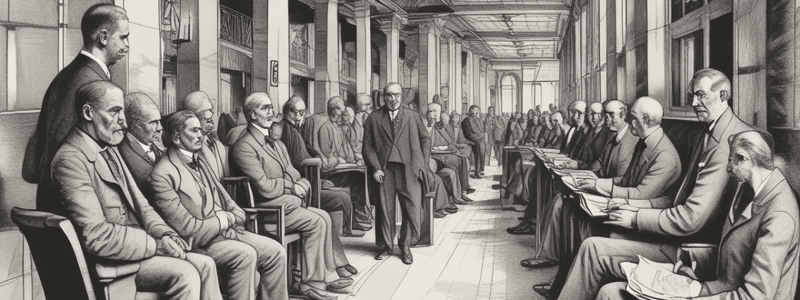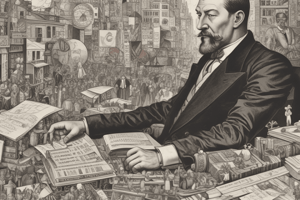Podcast
Questions and Answers
What is the primary consequence of modernization according to sociological theory?
What is the primary consequence of modernization according to sociological theory?
This weakens the traditional bonds of family, kinship, and religion.
What concept did Max Weber use to distinguish between two types of social relationships?
What concept did Max Weber use to distinguish between two types of social relationships?
Vergemeinschaftung and Vergesellschaftung.
What characterized pre-modern Western European societies?
What characterized pre-modern Western European societies?
Feudalism, agricultural economy, personal forms of authority, shared moral universe based on religion, and rigid men-women roles.
What is a key feature of modern Western European societies according to sociological theory?
What is a key feature of modern Western European societies according to sociological theory?
What is the primary characteristic of post-modern Western European societies?
What is the primary characteristic of post-modern Western European societies?
What is the result of the cultural turn in post-modern societies?
What is the result of the cultural turn in post-modern societies?
What is a consequence of modernization on social relationships?
What is a consequence of modernization on social relationships?
What is a key feature of new social movements in post-modern societies?
What is a key feature of new social movements in post-modern societies?
What are the three major methodological directions in sociology discussed in Part III of the course?
What are the three major methodological directions in sociology discussed in Part III of the course?
How does Part IV of the course approach the study of modernity?
How does Part IV of the course approach the study of modernity?
What is the focus of the study of classical authors like Weber, Durkheim, Marx, and others in Part IV of the course?
What is the focus of the study of classical authors like Weber, Durkheim, Marx, and others in Part IV of the course?
What is the primary concern of sociological inquiry in the context of modernity?
What is the primary concern of sociological inquiry in the context of modernity?
How does the course address the limitations of scientific truth claims in social sciences?
How does the course address the limitations of scientific truth claims in social sciences?
What is the significance of the cultural turn in sociological theory?
What is the significance of the cultural turn in sociological theory?
How does modernization impact social inequality?
How does modernization impact social inequality?
What is the significance of postmodernity in sociological theory?
What is the significance of postmodernity in sociological theory?
What are the key characteristics of modernity, and how did early sociologists respond to the social upheaval it caused?
What are the key characteristics of modernity, and how did early sociologists respond to the social upheaval it caused?
What are the primary differences between modernity and postmodernity, and how do they relate to the concept of globalization?
What are the primary differences between modernity and postmodernity, and how do they relate to the concept of globalization?
How do sociologists of modernity and postmodernity approach the concept of culture, and what implications does this have for our understanding of social inequality?
How do sociologists of modernity and postmodernity approach the concept of culture, and what implications does this have for our understanding of social inequality?
What is the significance of the 'reflection point' in the context of modernity and postmodernity, and how does it relate to the concept of sociological theory?
What is the significance of the 'reflection point' in the context of modernity and postmodernity, and how does it relate to the concept of sociological theory?
How does the concept of multiculturalism relate to the sociological theories of modernity and postmodernity, and what implications does it have for our understanding of social inequality?
How does the concept of multiculturalism relate to the sociological theories of modernity and postmodernity, and what implications does it have for our understanding of social inequality?
What is the significance of the concept of 'life cycle changes' in the context of postmodernity, and how does it relate to the concept of socialization?
What is the significance of the concept of 'life cycle changes' in the context of postmodernity, and how does it relate to the concept of socialization?
How does the concept of globalization relate to the sociological theories of modernity and postmodernity, and what implications does it have for our understanding of social inequality?
How does the concept of globalization relate to the sociological theories of modernity and postmodernity, and what implications does it have for our understanding of social inequality?
What is the significance of the concept of 'derationalization' in the context of postmodernity, and how does it relate to the concept of social organization?
What is the significance of the concept of 'derationalization' in the context of postmodernity, and how does it relate to the concept of social organization?
How does Max Weber's concept of 'Vergemeinschaftung' differ from 'Vergesellschaftung' in understanding social relationships?
How does Max Weber's concept of 'Vergemeinschaftung' differ from 'Vergesellschaftung' in understanding social relationships?
What are the implications of modernization on traditional social bonds and institutions?
What are the implications of modernization on traditional social bonds and institutions?
How do modern Western European societies differ from their pre-modern counterparts?
How do modern Western European societies differ from their pre-modern counterparts?
What is the significance of the 'cultural turn' in post-modern societies?
What is the significance of the 'cultural turn' in post-modern societies?
How do new social movements in post-modern societies differ from their modern counterparts?
How do new social movements in post-modern societies differ from their modern counterparts?
What is the relationship between modernization and social inequality?
What is the relationship between modernization and social inequality?
How does the concept of 'Occidentalism' relate to the narrative of progress and evolution in modern Western European societies?
How does the concept of 'Occidentalism' relate to the narrative of progress and evolution in modern Western European societies?
What is the significance of 'de-rationalization' in post-modern societies?
What is the significance of 'de-rationalization' in post-modern societies?
How do the concepts of modernity and postmodernity relate to the broader historical and social processes that shaped the development of sociology as a discipline?
How do the concepts of modernity and postmodernity relate to the broader historical and social processes that shaped the development of sociology as a discipline?
What role does culture play in the sociological theories of modernity and postmodernity, and how do these differing approaches impact our understanding of social inequality?
What role does culture play in the sociological theories of modernity and postmodernity, and how do these differing approaches impact our understanding of social inequality?
How do the works of early sociologists, such as Marx, Weber, and Durkheim, contribute to our understanding of modernity and its social upheaval?
How do the works of early sociologists, such as Marx, Weber, and Durkheim, contribute to our understanding of modernity and its social upheaval?
What is the significance of the 'reflection point' in the context of modernity and postmodernity, and how does it relate to sociological theory?
What is the significance of the 'reflection point' in the context of modernity and postmodernity, and how does it relate to sociological theory?
How does the concept of globalization relate to the sociological theories of modernity and postmodernity, and what implications does it have for our understanding of social inequality?
How does the concept of globalization relate to the sociological theories of modernity and postmodernity, and what implications does it have for our understanding of social inequality?
What is the significance of the concept of 'life cycle changes' in the context of postmodernity, and how does it relate to the concept of socialization?
What is the significance of the concept of 'life cycle changes' in the context of postmodernity, and how does it relate to the concept of socialization?
How does the concept of multiculturalism relate to the sociological theories of modernity and postmodernity, and what implications does it have for our understanding of social inequality?
How does the concept of multiculturalism relate to the sociological theories of modernity and postmodernity, and what implications does it have for our understanding of social inequality?
What is the significance of the concept of 'derationalization' in the context of postmodernity, and how does it relate to the concept of social organization?
What is the significance of the concept of 'derationalization' in the context of postmodernity, and how does it relate to the concept of social organization?
What is the primary focus of sociology in understanding the relationship between individuals and society?
What is the primary focus of sociology in understanding the relationship between individuals and society?
What is the concept of 'sociological imagination' as coined by C. Wright Mills?
What is the concept of 'sociological imagination' as coined by C. Wright Mills?
What distinguishes a 'Gemeinschaft' (community) from a 'Gesellschaft' (society) according to Ferdinand Tönnies?
What distinguishes a 'Gemeinschaft' (community) from a 'Gesellschaft' (society) according to Ferdinand Tönnies?
How does the concept of 'Gemeinschaft' (community) manifest in social relationships?
How does the concept of 'Gemeinschaft' (community) manifest in social relationships?
What is the primary characteristic of 'Gesellschaft' (associational society) in modern societies?
What is the primary characteristic of 'Gesellschaft' (associational society) in modern societies?
What is the role of reason in 'Gemeinschaft' (community) societies?
What is the role of reason in 'Gemeinschaft' (community) societies?
How does sociology approach the study of social problems?
How does sociology approach the study of social problems?
What is the primary goal of sociology in studying society?
What is the primary goal of sociology in studying society?
Flashcards are hidden until you start studying
Study Notes
Introduction to Sociology
- Sociology studies the modern world and its complexities, focusing on the nature of society, social relationships, and the effects of modernity on individuals and groups.
Max Weber's Concepts
- "Vergemeinschaftung" (communal society) vs. "Vergesellschaftung" (associated society)
- Ideal types: simplified concepts to understand complex realities, not rational categorizations
- Focus on processual, reversible nature of historical phenomena, not linear progressive development
Characteristics of Societies
Pre-Modern (Western) European Societies
- Feudalism; agricultural economy
- Personal forms of authority
- Shared moral universe based on religion
- Tradition
- Rigid men-women roles
- Local, ascribed identity
Modern (Western) European Societies
- Industrial capitalism; urbanization; material inequality
- Impersonal authority: centralization and bureaucratization
- Problem of social integration
- Rationalization
- Rigid male-female roles remain unchallenged
- Public versus private life
- Occidentalism (implied superiority of the West)
- Narrative of progress and evolution
Post-Modern (Western) European Societies
- Post-industrial economies based on services and information
- Decentralized organization
- Cultural turn: dominance of mass media and popular culture; consumption over production; language, symbols, and meanings
- De-rationalization
- New social movements (e.g., gender relations), multiculturalism, difference
- Socialization, identity, and life cycle redefined
- Globalization and new forms of inequality
Modernity and Postmodernity
- Modernity: historical processes transforming traditional societies, leading to nation-states, capitalism, bureaucratization, urbanization, and secularization
- Early sociologists (Marx, Weber, Simmel, Durkheim) studied modernity's social upheaval and disruptions
- Sociology of modernity: economic industrial life; social organization; integration; culture; socialization of women; public vs. private; occidentalism vs. orientalism
Postmodernity
- Contemporary developments in historical, social, and economic processes
- Sociology of postmodernity: post-industrial economic life; relevance of culture; de-rationalization; new social movements; multiculturalism and difference; life cycle; inequalities; globalization
Reflection Point
- Is the distinction between modernity and postmodernity real?
- Are they part of the same larger process?
Course Content and Structure
- Part III: Methodological Debates (Positivism, Interpretivism, Critique)
- Part IV: Analyzing Culture and Social Change / Analyzing Historical Formations of Modernity
What is Sociology?
- Sociology studies the nature and limitations of scientific truth claims in the social sciences.
Introduction to Sociology
- Sociology is the scientific study of man and society, focusing on the relationship between the individual and social structures.
Modernity
- Modernity refers to the historical processes that transformed the traditional post-medieval order, leading to the rise of:
- Nation-state
- Economic capitalism
- Bureaucratization
- Urbanization
- Secularization
- Early sociologists (Marx, Weber, Simmel, Durkheim) sought to understand the social upheaval and disruptions caused by these processes.
Sociology of Modernity
- Focused on:
- Economic industrial life
- Social organization
- Integration
- Culture
- Socialization of women
- Public vs. private life
- Occidentalism vs. Orientalism
Postmodernity
- Refers to contemporary developments in historical, social, and economic processes, characterized by:
- Post-industrial economies
- Decentralized organization
- Derationalization
- Multiculturalism
- Life cycle changes
- Renewed emphasis on culture
- Globalization
Sociology of Postmodernity
- Examines:
- Post-industrial economic life
- Relevance of culture
- Derationalization
- New social movements
- Multiculturalism and difference
- Life cycle
- Inequalities
- Globalization
Key Concepts
- Vergemeinschaftung (communalization) vs. Vergesellschaftung (societalization) (Max Weber, 1921)
- Ideal types: concepts simplifying complex reality, constructed inductively from observation and analysis of historical processes.
- Gemeinschaft (community) vs. Gesellschaft (society) (Ferdinand Tönnies, 1887)
- Sociological Imagination (C. Wright Mills): understanding one's own experience and how it fits into the larger world experience.
Characteristics of Societies
- Pre-modern (western) European societies:
- Feudalism
- Agricultural economy
- Personal forms of authority
- Shared moral universe based on religion
- Tradition
- Rigid men-women roles
- Local, ascribed identity
- Modern (western) European societies:
- Industrial capitalism
- Urbanization
- Material inequality
- Impersonal authority
- Problem of social integration
- Rationalization
- Rigid male-female roles remain unchallenged
- Public vs. private life
- Occidentalism vs. Orientalism
- Narrative of progress and evolution
- Post-modern (western) European societies:
- Post-industrial economies
- Decentralized organization
- Cultural turn
- Derationalization
- New social movements
Studying That Suits You
Use AI to generate personalized quizzes and flashcards to suit your learning preferences.




